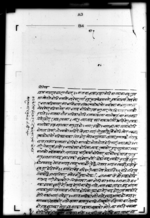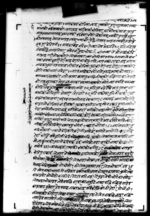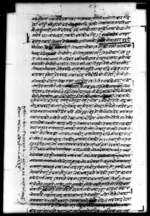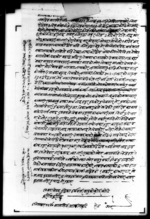A petition from the merchant Harṣapati of Tuṃche to the government of Nepal regarding the plundering of his shop in Lhasa (VS 1940)
ID: E_1448_0046
Edited and
translated by Ramhari Timalsina
in collaboration with
Bal Gopal Shrestha and Rabi Acharya
Created: 2016-12-14;
Last modified: 2025-11-17
For the metadata of the document, click here
The accompanying edition, translation/synopsis and/or commentary are available under the terms of the Creative Commons Attribution-ShareAlike 4.0 International License
Abstract
This letter provides graphic details of a ransacking of Harṣapati Udāsa's trading house by Tibetans during a general riot throughout Lhasa. The merchant petitions the government of Nepal for compensation and seeks to justify the amount claimed.Diplomatic edition
[1r-part1]
श्री \1वितिपत्र2उप्रान्तमाहाराजकरुणानीधान३५सालमाल्हासाहाम्राकोठिमागयाकाभाइरगुम
3स्तास्मेतलेकोठिमावसिवंदवेपारगर्दाहजुरकापुन्येप्रतापलेरपुर्षाकाधर्म्मलेवंदवेपा
4रचलनवढियातवरसंगचलिकामवनिआयाकोथीयोअघीपठायाकागुमस्ताहरु
5लेवंदवेपारवढियातवरसंगचलाइकोठिकोरासअनुसारनफाकिफाय़तभया़को
6हुनाले३९सालमानीजअघिकाकोठिवालाकावदलामाजोचाहीन्यामालमत्ता
7दिमेराछोरारअरुगुमस्ता६ज्मा७जनालाइपठायाकाथीञौंअघिमेरावावाका
8पालादेषीहाकुवहालकासाहुहरुको३भागरहाम्रो१भागलाग्न्यासाजाकोठि
9कोनगदजिन्सिजोभयाकोअघिदेषिवन्दानगरिगोसुव़ारैराषिकोठिस्मेतनचलाइ
10राष्याकोथियोपछिपठायाकानिजछोरास्मेतकागुमस्ताल्हासापुग्यापछिसोहाकु
11वहालहरुसंगकासाजाकोठिकोमालकोमोलजोलकेहिनगरिअंदाजले४वन्दा
12गरिगोलाराषिहाम्रो१भागकोवन्दाकोठिमाल्याइराष्याकोरपुरानागुमस्ताहरुका
13मालाकोसकेसम्मकोलहनाउठाइभारिवाधीकोठिमारह्याकोवाकिमालरसाहु
14साहुहालवालालाइवुझाइसकीवंदवेपारचलीकिफायत्भयाकोहुनालेहजुर
15कोजयमनाइनेपालआउनुतयारभयाकोरहेछनिजहरुआउननपाउदैहाम्रोचु
16ककसुरकेहिनभै३९सालकाचैत्रवदि३०रोजकादिनअदाजि१/२घडिजतिरात
17गयापछिहातहतियारसमेतली⟪हाम्राकोठीमासदैआईवसिकारोवारगर्न्यायोचीजयसजगामाराषेकोछभनीजांन्या⟫वाडाभोट्याकोजत्थाभैसोहाम्राकोठि
18माआइगारोढोकाफोरीभित्रपस्दाज्माकोठिमा१४/१५जनामानिसभ
19याकाठाउमाहजारौवैरिआइघेरादीयाकोहुनालेज्यानवच्याउनाकालाइआंगमा
20लायाकालुगागहनामात्रलीनीजकोठीमारह्याकामेराभाइछोरागुमस्ताकोठि
21छोडिमाथीभागिगयेछर३५सालअघिकावनौतालेवुझाइआयाकोसाल३५
22मागयाकालेलग्याकोरताहिल्हासामासाहुकाढिलीयाकोरपछिगयाकालेलग्या
23कोहाकुवहालकासाहुहरुसंगकावन्दामाल्यायाकोस्मेतज्मासंपतिभयाका
24कोठिभित्र⟪थीयो⟫नीजभोट्याहरुपसि१/२घडिरातचढेदेषिसारारातभरतल
[1r-part2]
25माथीकोकोठिलुटिवो़सारिविहानको१/२घडिवाकिमालुटिलीवाकीरह्या
26काजिन्सिमालमारवहिपत्रमाआगोलाइवेकम्मागराइगयापछिआगोलाइपोले
27काधुवालेकोठिसवैमजेरीमाथीरह्याकामानिसहरुलाइस्मेतदषलहुन्याजस्तोभ
28येछरआगोनीभानालाइपानिषोजदापानिकोभाडास्मेत⟪पायन⟫नभैकेहिलुटिल
29ग्याकोरकेहिभाडाहरुकोठिमाकाटिभाचीफोरिवेकम्मागरियाकोहुनालेवरपर
30पानिकोग्वाहारमाग्दापनिनिजउपद्र्याभोट्याहरुकाडरलेअरुकसैलेपानिल्याइ
31नदिय⟪नपछी⟫ताहिकोठिनेरावश्न्यावसुभोटेनी१नेपालीभोटेनी१इ२जनालेपानिरजु
32मकिभोट्यानीभन्यालेकेहिषानेकुरोलीआयेछरपानिलेआगोनिभाइसकि
33हेर्दाकोठिसवैलुटिलीकेहिथोरवहुतवाकिरह्याकोजिन्सिमालमापनिआ
34गोलाइगयाकोहुनालेकेहिवाकीछकीभनिषोजदालूनर्कोलामाकोघ्याजो
35ससमोरु३३३॥मावंधकलीराष्याकोचादीकोकटौरा७८वंधकीवाहेकचानचुन्
36केहिसुनचादीनीजहरुलेछाडीगयाको⟪रहेछन्⟫सोमालहरुयउटा
37थैलोमाराषेका⟪रहेछ⟫फेरिनिजवाडाभोट्याहरुलेराकोवालीआउदामा
38तैलाईकेहिवटुलेसोथैलो१लीनिजगुमस्ताहरुरनिजभोट्यानीहरु३व
39टिस्मेतमाथीभागीगैतहिवाटधर्मगर्न्यावाहालकोघ्यूपकालन्याचुलोवन्या
40काठाउमासोथैलोफालीदिनिजहरुपनिताहीगैपुंछानेवोभोटेकावसेछ
41निजवाडाभोट्याहरुलेतेसपछिवरावरमाललुटिलग्यापछिवकिलसाहेव
42काहावाटसुवेदारहरुपठाइजाचनआइसवैकोठिषोलीहेर्दारसोथैली१
43लीगयाकोवीहोरानिजगुमस्ताभाइछोराहरुलेनिजजाचकिलाइरवक्कि
44लसाहेवसंगस्मेतजाहेरगर्दानिजहरुलेजाचवुझगरिलेषिलग्याकोनिज
45भोटेहरु३दिनसम्मनीजतुंछानेवुकाघरमावसिफेरिलेषिलग्याकारनिजले
46थैलोलग्याकोरल्यायाकोवेहोरानीजवक्कीलसंगताकेतागरीलेषायाको
[1r-part3]
47ठूलोथैलीकाकुरालाइसमेतनीजतुंछानेवुरनीज३वटिभोटेनिलाइस्मेत
48भोटकाकचहरीमालगीकोरादिषाइषारषोरगरिसोझ्दासोथैलो१वाहेकअरु
49मालमकाहाल्यायाकोछैनभनिनीजतुंछानेवुलेरसोथैलीवाहेकअरुमाल
50मत्तालग्याकोहामिलेपनिदेष्याजान्याकोछैनभंन्यानीजभोटेनिहरुलेस्मेत
51कागजलेषिदियाकोषडाछअघिलुटिलग्याकामालकोहिसावदिदाकाहाकुवहा
52लकासाहुहरुसंगवन्दागरील्यायाकामालकोस्मेतगोस्वारामालकोहिसावदि
53याकोरसोहिसावमाञाहावाटलग्याकोरल्हासामासाहुकाढिलीयाकामाल
54कोस्मेतहिसावमाचर्हाइदियाकोरल्हासामालीयाको३०/३५हजारकोसाहुम
55हजुतछदैछहामीलेदीयाकाहिसावमाकेहिफरेवगरिधर्मछाडीवेइमानीगर्याका
56छैनौं⟪हामीलेदियाकोकागजमा२/४हजारकोघटीवढीवाहेकधर्मभाकनपनीसकछु
57धनकमाइअघीअघीपनिधर्मगर्याकोजाहेरैछ⟫१मानाषानाकालागीमात्रभयाहामिलेभोटमधेसगरिकमाउनुपर्न्या
58केहिथियनहजुरकोजयमनाइधर्म्मकर्म्मगर्नालाइरधनजम्मागरिराख्यावष
59तमाकामलाग्लाभंनालेविरानामुलुकभोटमधेसमागैज्युधनकोमायामारि
60कामगरिरह्याकाहुंधनकाअर्थलाइहजुरहरुकोपुन्येप्रतापलेरपुर्षाकाधर्म्म
61लेहामीवेपारीहुंकमाउदैरहुंलाविनाअपराधलेदेवप्रित्रिराजारैतकाकाम
62माकेहिगर्ननपाइदुसमनलेविचमाहजुरहरुकाकन्धापरिहामीनिर्धादुनिञाउ
63परकोजोरजुलुमलेलुटपिटगरिलग्याकोहुनालेसर्कारमामिजोविन्तिचढा
64याकाहौ⟪हाम्रोज्युधनसर्कारकोहुन्⟫साहुमाहाजनलेवेइमानीगर्योभन्याहजुरमासुभासंषाप
65र्योतापनिहाम्राहरुलाइल्हासामाभाइलेदियाकोरञाहामैलेदीयाका
66हिसावमा४/५हजारकमगरिहिसावदीयाकोछवढिहिसावदेषाइवेइमा
67निगर्याकोकेहिछैन⟪अरुसाहुमहाजनलेवेइमानगर्याकोवुझिवक्स्याजाहेरहोला⟫अरुकासरहमेरो⟪होइन⟫पठाइवक्सनापनिहवैनयस्मा
68श्रीफहजुरवेगरहाम्रोरक्ष्यारउधारगर्न्याअरुकोहिछैन५वर्षसम्मभाइगुम
[1r-part4]
69स्ताहरुलेवेपारगरीकमाइज्मागरीराष्याकोस्मेतज्मासंपतिनिजहरुले
70लुटिलग्यापछिहामीले५वर्षकोनफास्मेतपाउनुपर्न्याहोप्रभुहाम्राको
71ठिकोचलनवातवीहोराञाहासम्मकारोवारचलनचल्याकोछभन्याहाल
72साविककावक्कीलचीनजान्याश्रीकाजीसाहेवभोटसर्कारकाभारादारस्मे
73तलाइदुरुस्तजाहेरछनिजहरुसंगवुझिवक्स्यापनिहाम्रोवन्दवेपारचलन
74षुलस्तजाहेरहुन्याछजोहुकुम¯¯ ¯ ¯ ¯ ¯ ¯ ¯ ¯ ¯ ¯ ¯ ¯ ¯ ¯ ¯ ¯
75इतसदासेवकतुंछेकाहर्षपतीसाहुकोकोटीकोटी
76कुर्णैस्कुर्णैस्¯ ¯ ¯ ¯ ¯ ¯ ¯ ¯ ¯ ¯ ¯ ¯ ¯१
77इतिसम्वत१९४०सालमितिआश्वीनसुदिरोजशुभम्¯ ¯ ¯ ¯ ¯ ¯ ¯ ¯
Translation
[1r]
Petition
Uprānta: Compassionate Mahārāja, it is because of your virtue and valour and the moral integrity of [our] ancestors that [my] younger brother and an agent, who came to Lhasa in the year [VS 19]35 and [started] engaging in trade from their seat in a trading house, were [able to] run [our] business well and that the enterprise grew. Since the previously sent agents had run the business well and profits were commensurate with the house’s (large) quantity (of goods), we therefore, in the year [VS 19]39, sent my son and 6 other agents—altogether 7 persons—with the necessary merchandise to take the place of the previous house personnel. From the time of my father our business in Lhasa was running in partnership with traders from Haku Bahāla, of which 3 parts were owned by them and 1 by us. We did not split up the cash and goods but kept everything together in one place, even when we were not (actually) doing business. Once the subsequently sent agents reached Lhasa along with my son, the merchandise shared with the Hāku Bahāla people was divided into roughly 4 (equal) parts without any bargaining being done; we assembled our share, 1 part, and put it in the trading house. To the extent possible, they called in, [in the form] of merchandise, debt (owed to) former agents, packed it together and put it in the same place, and once they had distributed outstanding (orders of) merchandise and paid off current suppliers, they (started) doing business and making profits, and so have been hailing you, and were preparing to return to Nepal. However, before they could depart, [and] through no fault of our own, some 1–2 ghaḍis after sunset on the 15th (lit. 30th) day of the dark half of Caitra [VS 19]39, a gang of armed Bāḍā Bhoṭyās (i.e. Tibetans) who always came to our trading house and knew the things we traded in and had on hand came with weapons, broke down walls and doors and entered, and since a thousand (others) of hostile intent surrounded the trading house, where a total of 14–15 persons were residing, (these latter)—my younger brother, my son and the agents—in order to save their lives left the trading house and fled upstairs with only the clothes and ornaments they were wearing. All the assets—including what was returned by debtors before [VS 19]35, what (our personnel) who went (to Lhasa) in [VS 19]35 brought with them, what merchants took on loan (from us) in Lhasa and later brought back because they were leaving, and the portion [we] brought as [our] share of [what was held in common] with the Haku Bahāla traders—were kept in the trading house. For the whole night, starting from around 1–2 ghaḍis after sunset, these Bhoṭyās looted the trading house from top to bottom, taking (everything) away; some ghaḍis before sunrise they set fire to the remaining goods and account books, rendering them useless. [Even] after they left, the smoke from the fire they had set burning badly affected the trading house along with the people (hiding) above the ground floor. Unable to find even a single vessel of water to extinguish the fire, and even though they asked neighbours for help with water, no one brought any water for fear of the outrageous Bhoṭyās. Later, Vasu Bhoṭenī, who lives next-door to the trading house, and 1 or 2 Nepalese Bhotenīs brought them water, and [a woman] called Jumaki Bhoṭyānī some food. After they doused the fire, they looked (around) to see whether—given that the whole trading house had been looted and whatever goods remained had been set fire to—anything was left. It turned out that they had left behind 78 silver bowls, which Lūnarko Lāmā had deposited when borrowing 333 mohara rupaiyā̃s 2 sukās and a small amount of gold and silver. These items were in a bag. When the Bāḍā Bhoṭyās came back with torches, the agents and 3 Bhoṭenis took that bag and fled upstairs, [and] from there to a monastery, (where) they flung the bag down next to an oven for melting ghee for religious purposes. Then they went to stay at Tuṃchā Nevu Bhoṭe's place.
Afterwards, after the Bhoṭyās had continued on looting and taking away (things elsewhere), the emissary sent subedāras, who came to inspect all the trading houses, and the agents, my younger brother and my son explained events to the inspector and (later) to the emissary as well. Concerning the bag which was taken (from the trading house), Tuṃchā Nevu and the 3 Bhoṭenis were taken to a Tibetan court and questioned under threat of the whip about the large bag. Tuṃchā Nevu stated that no other articles except for that 1 bag had been brought to his place, while the Bhoṭenis made the [following] written statement: “We did not take away any goods except that bag, nor did we see or know of any (other goods being carried away).” (This is now) on record. [We] have provided an accounting of the goods looted: a record of the goods stored together (in the trading house), including the goods taken as our share during the division of property with the Hāku Bahāla traders; a record of the goods we took (to Lhasa) from here (i.e. Kathmandu) along with a record of goods traders in Lhasa took on loan; and there was also a group of traders in Lhasa who (collectively) took loans of 30–35 thousand (rupees in cash). In our accounting we have not made any false claim, acted unethically or behaved dishonestly. We are ready to swear solemnly in writing a margin of error of 2–4 thousand (rupees) up or down. It is well known that in the past, too, we have earned (profits) and (used them to) engage in religious activities.
It is in order [to acquire such] wealth that we are—through your virtue and valour and our ancestors’ religious deeds—businessmen, and will go on earning. We were unable, through no fault (of our own) to do anything in the way of work for gods, deceased ancestors, kings or commoners, and so, in acts of violence upon helpless persons, adversaries engaged in looting behind your backs. Therefore we are submitting this petition to you. Our lives and property belong to you. If you are in doubt whether these traders have made dishonest [claims], (I should like to assure you that) the amount I submitted is 4–5 thousand (rupees) less than the amount which my brother submitted to our (officials) in Lhasa. There is nothing [suggestive] of having acted dishonestly by showing an inflated amount. If you find out that other merchants have acted dishonestly, then it will be clear (that we haven’t). My [claim] is not like others’.
There is no one to protect us and look out for our well-being other than you. The mentioned persons looted all our property, including the earnings my brother and the agents made doing business for five years. (Now,) in the aftermath, we ought to receive [compensation], including the five years of profits. Lord, regarding the particulars of the operations of our trading house—how we have been doing business up to now—you may obtain solid information from both new and previous emissaries, kājis sent to China and officials of the Tibetan government. Our business practices will become clear when you make inquiries with them. Your mercy [be upon us].
Ever your servant, Harṣapatī Sāhu of Tũ Che [sends] crores and crores (of salutations): Salutations! Salutations!
On a day in the bright half of Āśvīna VS 1940 (1883 CE). Auspiciousness.
Commentary
On the first day of the bright half of Caitra VS 1939 (April 1883) the people of Lhasa were celebrating a religious festival around the Jokhang temple. Ratnaman, a Nepalese merchant, was in his jewellery shop at the time. A procession was passing by in front when four Tibetan women entered the shop. Two of them sat down to Ratnaman’s left and proceeded to buy five coral beads, while the other two women to his right set about examining three coral necklaces. The latter two women returned two of the necklaces but stashed away the third. Ratnaman noticed the disappearance and asked for the missing one back. Both of the women insisted on their innocence, and to prove it loosened their girdles and started shaking their bodies. Ratnaman remained unconvinced and started checking through his merchandise on display. Suddenly the two women fled, and Ratnaman sped off after them. During the pursuit one Bandhu Lama threw a clod of earth at the merchant to divert him. Despite this hindrance Ratnaman managed to capture the two women and hold them captive in his tent. There he exacted punishment, at one point even beating the women on the head. In the meantime the news of the seizure of the Tibetan women had swept like fire throughout Lhasa, and in no time a crowd of Tibetans assembled around his shop. The incident aroused strong anti-Nepalese sentiment, sparking off a riot joined in by laymen and by monks as well. By the end of it 84 Nepalese shops in Lhasa had been looted. The losses of the Nepalese merchants in this riot were put at 833,709 rupees. Tibetan officials, on being informed of the incident, instantly went to the Nepalese mission to express their regrets and promised to hold a full inquiry into the matter and give full redress. They also requested the vakila to communicate to the darabara that the outbreak of the riots was spontaneous and should not be mistaken for a politically motivated act. In any event, Nepal-Tibet relations took a turn for the worse, so much so that Nepal had to relocate its vakila and the merchants from Lhasa to Kerong. Tibet, instead of paying compensation, started preparations for war, and Nepal reciprocated with similar preparations. However, on 26 May 1884 both parties sat down for talks and negotiated a settlement, according to which Tibet agreed to pay in annual instalments over seven years a sum of 942,098 rupees to cover damages sustained during the looting, to restore as much plundered property as could be traced, and to punish all marauders captured according to Tibetan law (Uprety 1998: 90-96).
This document is part of the Cittadhara Hṛdaya collection. The documents E_1448_0015 and E_1448_0044 are related to it.




